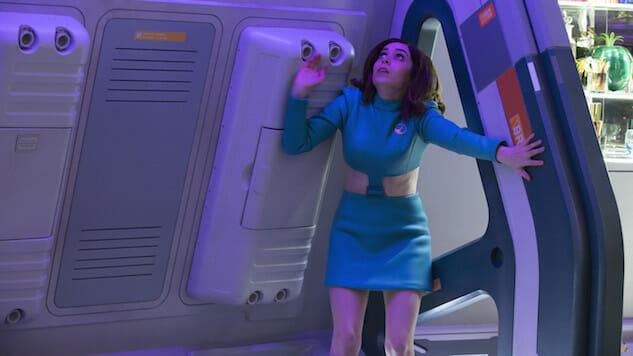Black Mirror: The Muddled “USS Callister” Opens Season Four on a Low Note
(Episode 4.01)
Photo: Jonathan Prime / Netflix TV Reviews Black Mirror
Virtual reality is a hot topic in speculative TV programming (and in the upcoming film Ready Player One), but it always seems to need another touchstone to be filtered through. Just as Westworld has its robo-populated Old West, Black Mirror’s “USS Callister” has its Star Trek, where Kirk has a great head of hair, balls of steel, and a commanding presence. The unsettling thing in digital Star Fleet, as the parody is named, is that its inhabitants are aware of their imprisonment.
With low self-esteem, bruised masculinity and the issues to back it up, the Chief Technical Officer (Jesse Plemons) of a VR gaming company is living a double life. There’s the one in the physical world, where he’s a bumbling, balding lump of men’s rights activism waiting to happen, and the one in the technicolor Star Fleet world of his creation, where his captain is worshiped and beloved. And yes, he’s done up to look a bit like the Dilbert creator.
Everyone he works with in real life (including characters played by Jimmi Simpson and Michaela Coel) mans his ship, because he’s used their DNA to put copies of them—their personalities, souls, consciousnesses, or what have you—into the game. This is just the beginning of the episode’s sprawling sci-fi rules and nonsense, so the fewer questions asked during its runtime, the better the plot goes down.
The CTO has godlike power over these code-people, making their faces disappear or turning them into monsters with the snap of a finger. They play along, but revolt is inevitable. All they need is a spark.
There are some Moon-like confrontations about sentience and personhood, but frankly it’s all a bit much for an episode whose audience surrogate is a geeky new employee (Cristin Milioti, who is definitely not one of those fake gamer girls you’ve heard so much about on the Internet) who shows up with a coder boner for Plemons’ character. Even if her character feels fake, she’s still part of the episode’s most effective moments. These are where Milioti is warned by Coel about Plemons, a woman looking out for her female colleague. This expresses the inherent toxicity and creepiness without needing the multiple layers of metaphor found in the game’s plotline.
This plotline, during which the ship’s prisoners/crew mourn their tortuorous immortality anew thanks to the addition of Milioti’s character, is full of Internet mumbo-jumbo and three or four mixed metaphors. There’s the fun and creepy refitting of familiar parts, shots and aesthetics, like how sound designers use benign objects to make the sickening squelches of horror movies, but there are frankly so many layers that the effective moments are drowned out.
Overpackaging its message, Charlie Brooker and William Bridges’ script buries the episode’s vicious premise (OK, one of its three or so premises) under so many references that it feels like an experimental Saturday Night Live skit that’s gone off the rails and gotten too weird for its own good. The CTO has created a virtual world where he’s in charge, but also the people in it are sentient and they need to contact themselves in the real world to escape, and it’s also told through Star Trek plotlines and… Ugh. I’m exhausted already. It’s not that it’s too busy to parse, it’s that all the brain space I’d use to enjoy it is occupied patching plot holes.
First, as is tradition when a godlike villain is introduced, the CTO’s omnipotence is a lot less omnipotent when it suits the story. Next, who do I need to call so that every screenwriter must attend a webinar explaining “the cloud” so I don’t have to watch their lazy endings anymore? It’s so much worse than the tired seduction plotline (which may or may not be a self-aware reference to Star Trek’s original series) that I’d be willing to set up the damn PowerPoint myself.
The comedy is far better than the actual story, though the references (within and without the show) used to bolster the latter are so heavy-handed, both in obvious shots and in on-the-nose costuming/hair/delivery, that their effectiveness dissipates. I get that it’s a dig at nostalgia nerds, but it’s not saying anything about why this escape to the past is bad. It’s just there. The episode’s ship runs on IT and gaming technobabble, then, when those are exhausted, uses its parody sources as last-resort fuel.
Despite it all, the performances make up for a lot of the muddledness, with everyone who’s given a chance more than rising to the occasion. In fact, a cameo by Aaron Paul pops a delicious cherry on an overly complex sundae with his representation of online gamer culture, proving that humanity’s most pure freedom is equal opportunity dickishness.
Read all of Paste’s episodic reviews of Black Mirror here.
Jacob Oller is a writer and film critic whose writing has appeared in The Guardian, Playboy, Roger Ebert, Film School Rejects, Chicagoist, Vague Visages, and other publications. He lives in Chicago, plays Dungeons and Dragons, and struggles not to kill his two cats daily. You can follow him on Twitter here: @jacoboller.